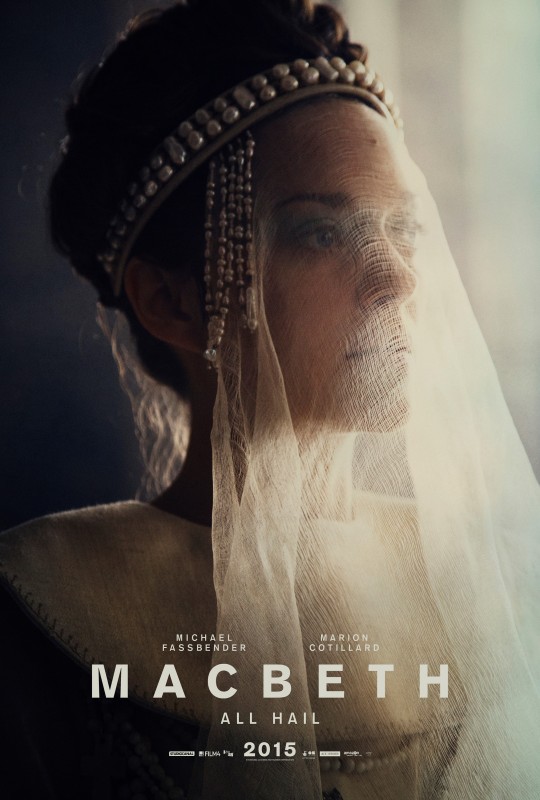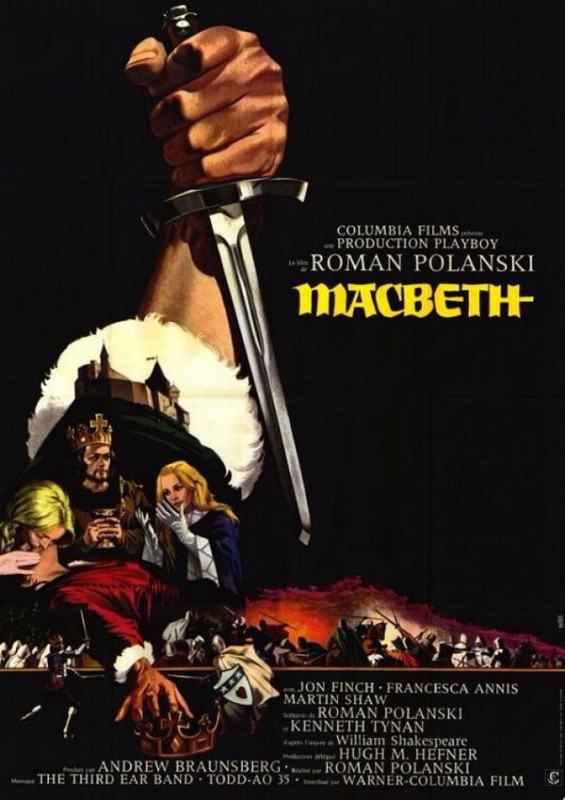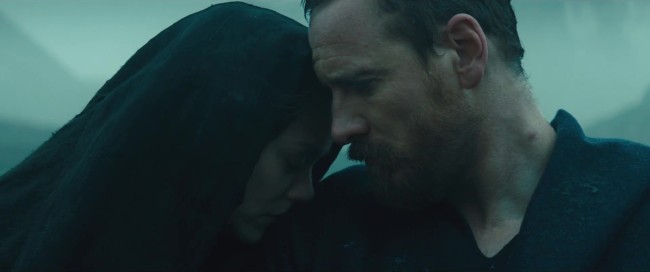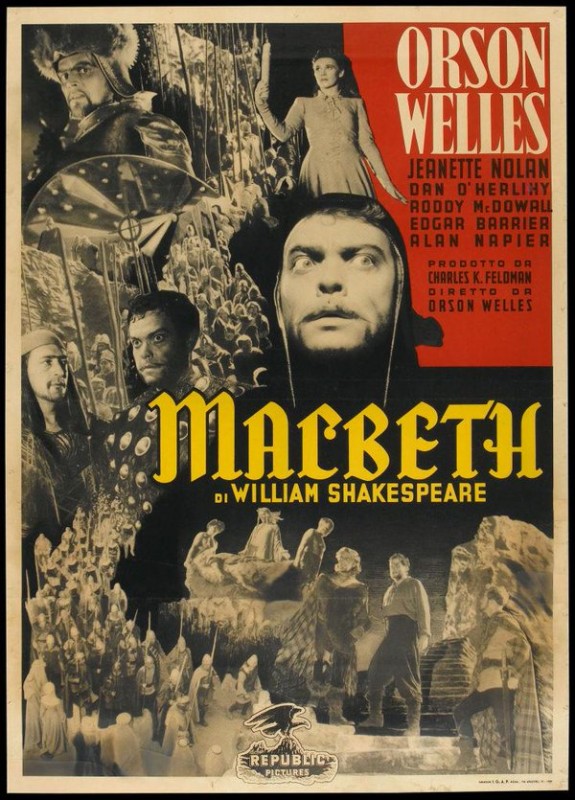By James Hancock December 4th, 2015
Reviewing movie adaptations of Shakespeare’s plays is always a tricky business, particularly with a play like Macbeth where there have already many worthy movie adaptations. I do not consider myself a Shakespeare scholar by any stretch of the imagination but I can lay claim to having once consumed an entire bottle of scotch while reading Macbeth for a class back in college. I make a point of reading Shakespeare’s plays beforehand anytime I am about to see them on the stage or on the screen and I’ve been lucky enough to have the opportunity to see several of Shakespeare’s plays performed at the RSC in Stratford-upon-Avon. But when it comes to Macbeth, the only stage version I have seen unfortunately was at the age of 15 when an under-funded traveling company with too few actors rather clumsily mounted a production for me and my utterly bewildered classmates. That said, I count Macbeth as my favorite play by Shakespeare. Whatever Shakespeare’s best play might be will take a smarter man than myself to determine, but I have always loved everything about Macbeth from the relentlessly dark tone to the subtle use of the supernatural. So the question remains of how the latest film adaptation by Justin Kurzel measures up both as an adaptation of the text as well as how it compares to the other film adaptations of the past. Under two hours in running time, this Macbeth is probably the fastest, most action-driven Macbeth on screen to date. What the film lacks in subtlety it more than makes up for in intensity with a grim, ruthless interpretation that makes Scotland resemble a dark land filled with nothing but horror and sadness. My American ears occasionally had trouble interpreting some of the dialogue growled by the cast as if they were trying to eviscerate each line with their bare teeth, but on the whole I was impressed with this very modern (in approach, not period), very cinematic take on a play that is over 400 years old. I would not place it on the same pedestal as previous versions by Welles, Kurosawa (Throne of Blood counts) and Polanski but I am glad that a new generation of moviegoers will now have a Macbeth to call their own.
If you are unfamiliar with the story, the plot follows a Scottish general named Macbeth who is fighting to unify Scotland under King Duncan. But when three witches prophesy that Macbeth will one day be King, he and his wife Lady Macbeth decide to accelerate the schedule by murdering their King, setting in motion an increasingly dark domino effect that ends in bloodshed and mayhem for just about the entire cast. The biggest challenge faced by any movie adaptation of Shakespeare’s work is how to open it up and avoid the staginess that has hindered some well-intentioned movie versions in the past. An excellent example of pulling this off successfully is Kenneth Branagh’s handling of Henry V (1989), a film that feels incredibly faithful to the text but richly cinematic all at once. Justin Kurzel’s approach with this film feels a bit like Braveheart (1995) and 300 (2006) had a baby, one that was abandoned and left to fend for itself on a rain-drenched battlefield littered with the bodies of dead Scots. If I have any complaints about this film is that it might too cinematic. I wouldn’t have minded a little staginess where I could savor some of the musicality of Shakespeare’s dialogue. That said, I really enjoyed the performances of David Thewlis as Duncan and Sean Harris as Macduff. Michael Fassbender as Macbeth holds nothing in reserve as he fights, fucks and snarls his way through the majority of the story. What works best for me is Fassbender’s chemistry with Marion Cotillard, an actress that I am always happy to see in action. As they plot to murder Duncan they get so carried away with their desire that they casually start having sex just out of frame as they continue to work out the details for what they have planned. If you’ve only read Shakespeare in a classroom, Kurzel’s liberal interpretation of Shakespeare’s notoriously sparse stage direction will definitely catch you by surprise.
So while this latest cinematic adaptation is not my favorite version of Macbeth, I have nothing but respect for the effort on the part of the cast and crew. Growing up, I took so many classes where Shakespeare was taught in the least compelling way imaginable, reading it for homework as if his plays were novels. At a bare minimum teachers need to get their students to stand up and act out some scenes, but better still is seeing an inspired adaptation on screen or on the stage. Filmmakers and audiences are so frequently intimidated by what they misinterpret as highbrow material when in actuality Shakespeare plays best when geared toward a rowdy, somewhat drunken mainstream audience. Orson Welles understood this probably better than anyone in the 20th century. Rather than having such reverence for the text that he was incapable of injecting any life into the material, instead he committed an act of literary heresy by reassembling fragments from five different Shakespeare plays and turning them into Chimes at Midnight (1965). Chimes at Midnight is not only my favorite movie version of Shakespeare’s work but also has an atmosphere that is so drenched in mud, blood, alcohol and laughter that one feels as if Welles somehow returned to the Middle Ages to shoot his film. This observations have nothing to do with Macbeth specifically but I think it is important for filmmakers like Justin Kurzel not to feel handcuffed creatively when attempting one of Shakespeare’s most beloved plays. For my own taste, I don’t particularly like how Kurzel decided to reveal how Birnam Wood eventually comes to Dunsinane, but literary purists should not freak out and try to lynch a director anytime they experiment with the text. If filmmakers can’t experiment with Shakespeare, movie adaptations will completely stagnate before going completely extinct. So once again, my hat is off to director Justin Kurzel and his crew for a very worthy effort. If I were teaching Macbeth to a classroom of teenagers, this is without question the movie I would show to them. I hope the film is a roaring success if only to encourage and incentivize future filmmakers to continue wrestling with the dynamic work of William Shakespeare.
I am one of the Co-Hosts of Wrong Reel and you can find more of our content here:
Join the Conversation on Twitter

My favorite adaptations of Macbeth:











